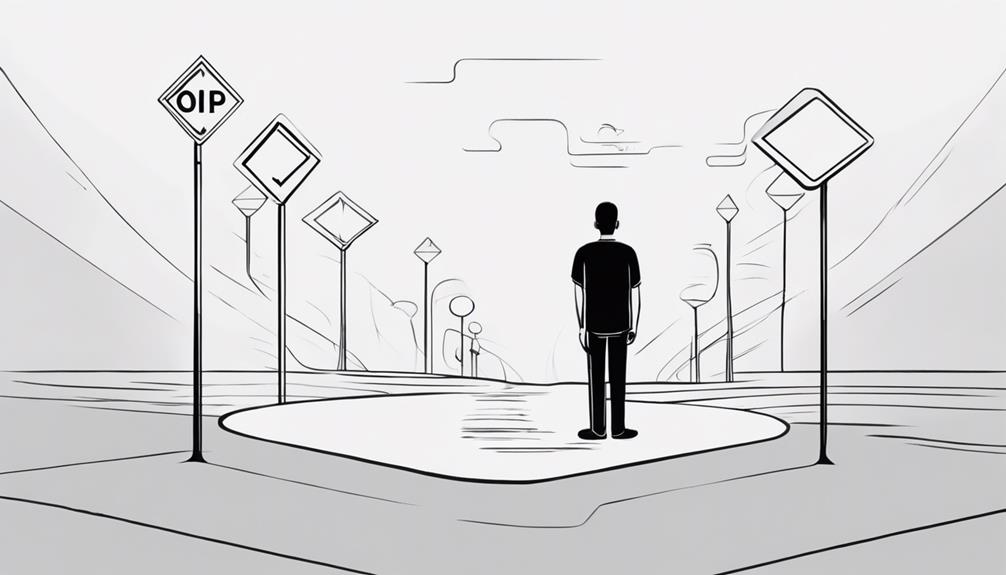Effective decision-making is a skill that can significantly impact personal and professional success. Strategies like setting time limits, gathering reliable information, and weighing options are crucial in honing this skill. However, the journey to improving decision-making entails more than just these steps. It involves a continuous process of learning, self-reflection, and adapting to different situations. So, how can individuals navigate this intricate process to make informed choices that yield positive outcomes?
Key Takeaways
- Set time limits to enhance urgency and prevent procrastination.
- Gather quality information from reliable sources for sound decisions.
- Use various data collection techniques like surveys and experiments.
- Develop critical thinking skills for objective and rational decision-making.
Setting Time Limits

The strategic implementation of time limits is a pivotal factor in enhancing decision-making proficiency and efficacy. Setting deadlines plays a crucial role in improving decision-making skills by providing a clear structure and sense of urgency. When individuals are faced with a specific timeframe to make a decision, it helps prevent procrastination and encourages timely action. By establishing deadlines, individuals are prompted to focus on the task at hand, reducing the likelihood of overthinking and indecision.
Moreover, prioritizing tasks within set time frames not only enhances productivity but also increases efficiency. This practice forces individuals to allocate their time wisely and allocate resources effectively. Consistently setting specific time limits for decision-making tasks can lead to a more structured approach, allowing individuals to hone their skills over time.
Information Gathering
Effective decision-making hinges on the quality of information gathered. It is imperative to employ robust data collection techniques and validate research sources rigorously to ensure the reliability and credibility of the information. By prioritizing accurate and comprehensive information, decision-makers can lay a strong foundation for sound judgment and strategic choices.
Data Collection Techniques
Utilizing a variety of data collection techniques is crucial for acquiring both quantitative and qualitative insights essential for informed decision-making processes. Surveys, interviews, and questionnaires are valuable for gathering quantitative and qualitative data to support decisions. Conducting focus groups and observation studies provides direct feedback from target audiences, enhancing decision-making skills. Data mining techniques help extract valuable information from large datasets, aiding in making informed decisions. Implementing A/B testing and experimentation allows for the comparison of different strategies to optimize decision outcomes effectively. Additionally, utilizing web analytics tools enables the tracking and analysis of user behavior and preferences for data-driven decision-making.
| Data Collection Techniques | Benefits |
|---|---|
| Surveys, interviews, questionnaires | Gather quantitative and qualitative data |
| Focus groups, observation studies | Direct feedback from target audiences |
| Data mining techniques | Extract valuable information from large datasets |
| A/B testing, experimentation | Compare strategies and optimize decision outcomes |
Research Sources Validation
Validating research sources for information gathering is a critical step in ensuring the credibility and reliability of the data used in decision-making processes. To validate sources, one should check for credibility, accuracy, and relevance to guarantee trustworthy information. Seeking peer-reviewed articles, academic publications, and reputable websites can support research findings. Cross-referencing information from multiple sources helps confirm consistency and reliability. It is essential to verify the expertise and credentials of authors or organizations providing the information to establish credibility. Utilizing fact-checking tools and databases can help verify the accuracy of statistics, data, and claims from different sources. By following these steps, one can ensure that the information used for decision-making is solid and dependable.
Distinguishing Facts and Opinions

Understanding the distinction between facts and opinions is crucial for honing critical thinking skills. By recognizing facts as objective truths and opinions as subjective viewpoints, individuals can enhance their ability to analyze information effectively. This skill is fundamental for making sound decisions based on evidence rather than personal biases.
Fact Vs Opinion
Distinguishing between facts and opinions is fundamental for enhancing decision-making skills by ensuring a basis in objective, verifiable information rather than subjective beliefs. Facts are objective, verifiable statements supported by evidence, while opinions are subjective beliefs or interpretations without concrete proof. Understanding this dichotomy is crucial for making informed decisions based on reliable information. The table below further illustrates the differences between facts and opinions:
| Aspect | Fact | Opinion |
|---|---|---|
| Definition | Objective, verifiable statements | Subjective beliefs |
| Verifiability | Supported by evidence | Lack concrete proof |
| Role in decision-making | Provides a strong foundation | Offers insights into perspectives |
This distinction is essential for fostering critical thinking and logical reasoning in the decision-making process.
Critical Thinking Skills
To enhance decision-making proficiency, the ability to discern between factual information and personal opinions is a critical component of developing strong critical thinking skills. Critical thinking involves distinguishing between verifiable facts and subjective opinions. Making well-informed decisions relies on differentiating between these two categories. By utilizing critical thinking skills, individuals can analyze information objectively, minimizing biases rooted in personal opinions. Rational decisions are facilitated by relying on factual evidence rather than subjective viewpoints. Hence, honing critical thinking skills not only aids in distinguishing facts from opinions but also enables individuals to make clearer, more objective decisions based on verifiable information, ultimately leading to more informed and rational choices.
Weighing Pros and Cons
When evaluating options, it is essential to meticulously assess the advantages and disadvantages to make well-informed decisions. To effectively weigh the pros and cons, consider the following:
- Compile a Comprehensive List: Ensure all choices are listed along with their corresponding pros and cons to have a clear overview of the situation.
- Rely on Data-Driven Decisions: Support your evaluations with data to minimize biases and subjective influences, leading to more objective conclusions.
- Conduct Cost-Benefit Analyses: Review earnings reports and analyze costs against benefits to quantify the advantages and disadvantages of each option.
- Utilize Decision-Making Tools: Employ methodologies like Decision Matrix Analysis for structured and objective evaluation, allowing for a systematic comparison of alternatives.
Focusing on Desired Outcomes

In decision-making processes, focusing on desired outcomes serves as a strategic anchor, guiding actions towards achieving predefined goals efficiently and effectively. By clarifying the desired outcomes, individuals can make quicker and more effective decisions. Aligning decisions with these desired outcomes reduces indecision and improves clarity in the decision-making process. Prioritizing actions that directly contribute to achieving the desired outcomes can streamline the decision-making process, ensuring that efforts are concentrated on what truly matters. Keeping the focus on the end result enhances decision-making efficiency and effectiveness.
| Importance of Focusing on Desired Outcomes |
|---|
| Streamlines decision-making process |
| Enhances clarity in decision-making |
| Aligns decisions with predefined goals |
Trusting Your Intuition
Building on the foundation of focusing on desired outcomes, trusting your intuition in decision-making processes can provide a valuable and complementary perspective. Intuition, rooted in subconscious pattern recognition, can offer insights that may not be immediately apparent through rational analysis alone. To make the most of this intuitive capability, individuals can consider the following:
- Experience and Expertise: Research indicates that honing intuition is possible through exposure and mastery in specific domains.
- Self-Awareness and Reflection: Trusting your intuition requires a deep understanding of your own thought processes and a willingness to reflect on past decisions where intuition played a role.
- Balancing Analytical Thinking: Integrating intuitive insights with analytical thinking can lead to a more comprehensive decision-making approach, leveraging the strengths of both methods.
- Confidence Building: Developing a sense of confidence in your intuition can enhance your overall decision-making abilities, providing a sense of assurance in uncertain situations.
Embracing Flexibility

Embracing flexibility in decision-making cultivates an adaptive mindset essential for navigating dynamic environments and optimizing responses to evolving circumstances. By being flexible, individuals can adapt to changing situations and incorporate new information into their decision-making process. This adaptability is crucial for creative problem-solving, as it allows for the exploration of alternative solutions that may not have been considered initially. Furthermore, embracing flexibility helps individuals handle unexpected challenges and opportunities with agility, fostering a sense of open-mindedness that is necessary for making well-informed decisions. This open-minded approach enables individuals to pivot when initial plans are not yielding the desired results effectively. Moreover, flexibility in decision-making promotes resilience, as it empowers individuals to adjust their course as needed to achieve better outcomes. Overall, embracing flexibility in decision-making enhances one's ability to respond effectively to varying circumstances and leads to more successful and adaptive decision-making processes.
Decision-Making Training
Enhancing decision-making skills through structured training programs is essential for fostering a strategic and agile workforce. Here are four key points emphasizing the importance of decision-making training:
- Skill Development: Decision-making training helps individuals enhance critical thinking, active listening, and crisis management skills, enabling them to make well-informed decisions in various scenarios.
- Confidence and Abilities: Access to decision-making courses is crucial for employees to boost their confidence and improve their decision-making abilities, leading to more effective problem-solving skills.
- Impact on Productivity: Training in decision-making significantly influences productivity levels, employee well-being, and overall company success by ensuring that critical decisions are made efficiently and effectively.
- Strategic Investment: Investing in decision-making training resources, such as off-the-shelf materials, provides employees with fresh perspectives and tools to improve their decision-making capabilities. This, in turn, helps companies avoid costly mistakes and enhances strategic decision-making processes.
Frequently Asked Questions
How Can I Improve My Decision-Making?
To enhance decision-making, individuals must cultivate critical thinking, problem-solving, and analytical skills. Furthermore, understanding emotional intelligence, cognitive biases, risk assessment, and the balance between intuition and logic is crucial. By incorporating these elements, one can make informed and effective decisions. Seeking diverse viewpoints, embracing imperfection, and aligning choices with organizational values are additional strategies for improving decision-making capabilities. Continuous learning and adaptation are essential for honing these skills.
How Do I Train Myself to Make Better Decisions?
How can cognitive training, mindfulness practice, critical thinking, analytical skills, problem-solving techniques, decision-making exercises, and emotional intelligence enhance decision-making abilities? By engaging in structured training programs, individuals can develop a holistic approach to decision-making. Through deliberate practice and exposure to diverse scenarios, one can cultivate a well-rounded skill set that fosters effective decision-making strategies. This comprehensive approach ensures a robust foundation for making better decisions in various contexts.
How Can I Improve My Rapid Decision-Making?
Improving rapid decision-making involves honing quick reactions, managing time pressure effectively, mastering impulse control, conducting thorough risk assessments, boosting confidence, developing intuition, and practicing stress management techniques. It requires a strategic approach to enhance cognitive abilities and situational awareness. By refining these skills through targeted exercises and seeking feedback from mentors, individuals can cultivate the agility needed to make sound decisions swiftly and confidently under pressure.
What Are the Five 5 Decision-Making Skills?
Critical thinking, analytical reasoning, problem-solving techniques, data interpretation, and strategic planning are paramount decision-making skills. These skills allow individuals to assess situations, evaluate options, and make informed choices. Strengthening emotional intelligence and risk assessment further enhances the decision-making process. Research shows that individuals with well-honed decision-making skills have a 20% higher chance of achieving successful outcomes in their personal and professional endeavors.
Conclusion
In conclusion, honing decision-making skills through strategies such as setting time limits, gathering information, and weighing pros and cons is essential for making effective choices. Research shows that individuals who engage in decision-making training are 80% more likely to make successful decisions in various aspects of their lives. By continuously practicing and refining these skills, one can improve their ability to make sound judgments and navigate complex situations with confidence.
